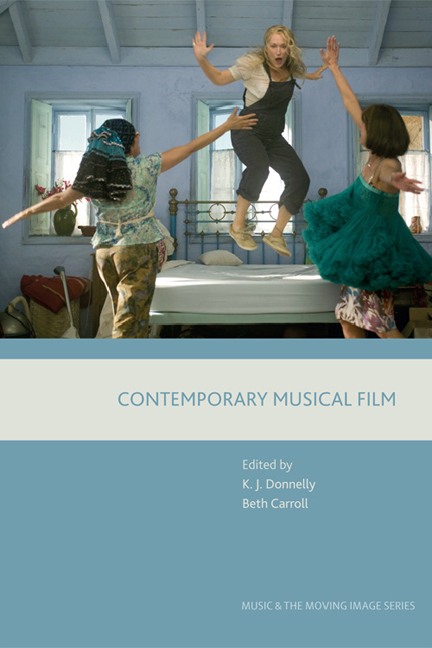Book contents
- Frontmatter
- Contents
- Illustrations
- Contributors
- Introduction: Reimagining the Contemporary Musical in the Twenty-first Century
- PART ONE ORIGINAL MUSICALS
- 1 Aesthetic Absurdities in Takashi Miike's The Happiness of the Katakuris
- 2 Film and the Twilight of Rock (Rock is Dead and Film Killed It): Post-millennial Rock Musicals
- 3 Team America: World Police: Duplicitous Voices of the Socio-political Spy Musical
- 4 The Anti-musical or Generic Affinity: Is there Anything Left to Say?
- 5 ‘Is This Real Enough For You?’: Lyrical Articulation of the Beatles' Songs in Across the Universe
- 6 ‘Love Is an Open Door’: Revising and Repeating Disney's Musical Tropes in Frozen
- PART TWO STAGE TO SCREEN
- PART THREE MUSICALS BY ANOTHER NAME
- Index
1 - Aesthetic Absurdities in Takashi Miike's The Happiness of the Katakuris
from PART ONE - ORIGINAL MUSICALS
Published online by Cambridge University Press: 03 January 2018
- Frontmatter
- Contents
- Illustrations
- Contributors
- Introduction: Reimagining the Contemporary Musical in the Twenty-first Century
- PART ONE ORIGINAL MUSICALS
- 1 Aesthetic Absurdities in Takashi Miike's The Happiness of the Katakuris
- 2 Film and the Twilight of Rock (Rock is Dead and Film Killed It): Post-millennial Rock Musicals
- 3 Team America: World Police: Duplicitous Voices of the Socio-political Spy Musical
- 4 The Anti-musical or Generic Affinity: Is there Anything Left to Say?
- 5 ‘Is This Real Enough For You?’: Lyrical Articulation of the Beatles' Songs in Across the Universe
- 6 ‘Love Is an Open Door’: Revising and Repeating Disney's Musical Tropes in Frozen
- PART TWO STAGE TO SCREEN
- PART THREE MUSICALS BY ANOTHER NAME
- Index
Summary
The late 1990s were an exciting time for Japanese cinema. After significant competition from television in the early 1970s saw studios such as Nikkatsu turn to erotic films (pinku) and Daiei face bankruptcy, the nation was experiencing something of an international resurgence by the late 1990s. Aided by the worldwide proliferation of DVDs, the charge was led predominantly by a number of filmmakers who had cut their teeth on V-cinema. Originally a branding specifically for Toei's line of straight-to-video productions, V-cinema became a catch-all for OV (Original Video) films; an arena which granted the freedom for newcomers to try their hand at directing and assistant directors such as Hideo Nakata and Takashi Shimizu the freedom to break away and develop unique voices of their own.
Arguably the most successful of the V-cinema graduates is Takashi Miike, who remains one of the biggest names in Japanese cinema, both domestically and internationally. Due to his breakthrough film Audition (Takashi Miike, 1999), distributors were quick to paint Miike as the new ‘king of extreme’, despite only having produced two real horror films by the time of The Happiness of the Katakuris (Takashi Miike, 2001). As a self-proclaimed ‘director for hire’, it is not the choice of projects or genres that define him as a director, but rather his approach to genre. As a director, Miike's career is more akin to filmmakers such as Teruo Ishii and Norifumi Suzuki than someone like John Carpenter, producing up to seven films a year in the early 2000s, almost always as assignments rather than personal projects. Whilst as an assistant director for television Takashi Miike worked with directors such as Yukio Noda, perhaps best known in the west for Zero Woman: Red Handcuffs (Yukio Noda, 1974) and the second Golgo 13 film, Golgo 13: Assignment Kowloon (Yukio Noda, 1977). More importantly, however, he moved on to working as assistant director for film, most notably under Shohei Imamura (on Zegen [Shohei Imamura, 1987] and Black Rain [Shohei Imamura, 1989]), a director well known for blurring styles and the lines between feature films and documentary performance.
- Type
- Chapter
- Information
- Contemporary Musical Film , pp. 13 - 24Publisher: Edinburgh University PressPrint publication year: 2017

